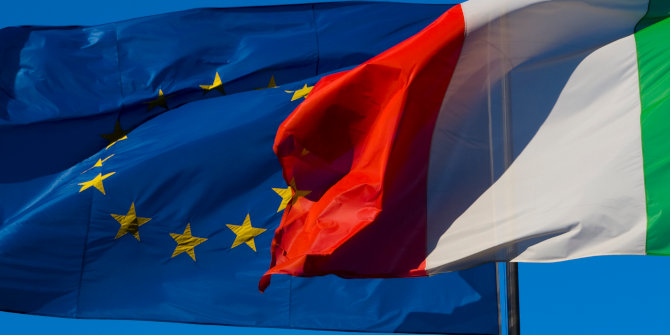 One of the more controversial ideas put forward during the Greek debt crisis has been the suggestion by the German Finance Minister, Wolfgang Schäuble, that Greece could temporarily leave the Eurozone for a period of five years. Miguel Otero-Iglesias writes that while the idea itself has been widely criticised, the hard-line taken by Schäuble, and the subsequent U-turn by the Greek Prime Minister Alexis Tsipras, has paradoxically reduced any real potential for a Grexit to take place.
One of the more controversial ideas put forward during the Greek debt crisis has been the suggestion by the German Finance Minister, Wolfgang Schäuble, that Greece could temporarily leave the Eurozone for a period of five years. Miguel Otero-Iglesias writes that while the idea itself has been widely criticised, the hard-line taken by Schäuble, and the subsequent U-turn by the Greek Prime Minister Alexis Tsipras, has paradoxically reduced any real potential for a Grexit to take place.
The Greek drama has just produced the greatest twist in the plot. Although his manners were teutonically rude, the German Minister of Finance Wolfgang Schäuble’s much criticised Grexit strategy has achieved something miraculous. Intentionally or not – only he knows – it killed the Grexit fairy tale told for so long by well-known US, UK and German academic economists.
From the start of the race, it was clear that the game of chicken between Syriza and Germany would always be won by the side able to convince their opponent that they were ready to jump into the abyss of Grexit. Alexis Tsipras, the Greek Prime Minister, was close with the referendum on 5 July. But Schäuble did not blink. On the contrary, he stamped on the accelerator, and once Tsipras had taken a good look into the black hole of Grexit, he pulled the hand-break and made a U-turn.
Tsipras’ volte-face demonstrates that the economists who call for Grexit might have their economics right (a devaluation could potentially benefit the country) but they have their politics and sociology awfully wrong. There is a reason why 70 per cent of Greeks want to stay in the euro. They know their country well. This is why they have accepted Tsipras’ capitulation in Brussels and encouraged their Parliament to vote, for the first time with an overwhelming majority, in favour of this harsh third rescue package.
Until now many in Greece, both on the far left and the far right, dreamed of a better life with the Drachma. Schauble’s Grexit plan, and Tsipras’ reaction to it, have brought them back to reality. Living standards will fall in Greece over the coming years, but Grexit would be much worse. More than any other European leader, over the past six months Tsipras has weighed up the pros and cons of an exit. His determination to stay is a strong message for anyone who will be at the same juncture in the future.
Although the Greek people are not the most Europeanised citizens of the Eurozone, even today, despite their hardship, most Greeks associate membership to the inner club of the EU with progress, modernity and high living standards. They look to their neighbours – Turkey, Bulgaria, Macedonia and Albania – and know they are better off. Leaving the euro would be a national humiliation much larger than the one experienced by Tsipras in Brussels.
Another element of the fairy tale is that a transition to the Drachma could be done smoothly. This is wishful thinking. Most Greeks oppose leaving the club. They will fight Grexit; even violently. Thus, if it happened, Greece would be mired in political instability: the worst possible environment to introduce a new currency. ‘Euroisation’, Montenegro-style, would be the most likely scenario.
As Tsipras has pointed out, the losers of Grexit would be the poorer and lower-middle classes. By contrast, the winners would be the conservative elites, who have stashed their savings abroad and are eagerly waiting for the introduction of the ever-devaluating New Drachma in order to use their hard euros to buy assets on the cheap. This would only increase the wealth gap between rich and poor in a country that is already highly unequal.
Schäuble’s in-your-face-Grexit therapy and Tsipras’ U-turn have achieved two outcomes hardly anyone envisioned a couple of months ago. First, the German Bundestag has agreed another rescue package for Greece, making many Germans grudgingly accept that we are de facto in a transfer union. Second, most of the radical left in the South of Europe has now realised that leaving the euro is not an option. The structural constraints and potential risks are too huge.
People in the South want to stick to the core of the Eurozone, not because they want, or are forced, to become German, as is often stated by Anglo-American commentators, but because they aspire to have the same capitalist and democratic institutional frameworks (more meritocracy and less clientelism and corruption) found in central and northern Europe.
Now that the Grexit fairy tale has been killed off and the social-democratic and hard left, including the anti-establishment Spanish party Podemos, seem to have acknowledged the structural constraints of leaving the euro, perhaps they will focus their efforts on changing the structural conditions of the Eurozone. It is clear that Merkel cannot permanently decide the fate of the Union. She has no legitimacy to do so. The Eurozone needs to move towards a fiscal and political union to survive, but to get there Europe’s social-democracy and France need to play a more active role.
In this regard, it is positive to see Hollande both stand firm against Grexit – if Paris says no it will not happen; forcing Berlin to eventually agree on a debt restructuring – and call for the creation of a European Finance Minister and a Eurozone Parliament. The only way to test whether Schäuble and the German public are true Europeans, as they constantly claim, is to match their bet and force them to show their cards.
Please read our comments policy before commenting.
Note: This article gives the views of the author, and not the position of EUROPP – European Politics and Policy, nor of the London School of Economics. Featured image credit: Jeff Djevdet (CC-BY-SA-3.0)
Shortened URL for this post: http://bit.ly/1Onsr2g
_________________________________
 Miguel Otero Iglesias –Elcano Royal Institute
Miguel Otero Iglesias –Elcano Royal Institute
Miguel Otero Iglesias is Senior Analyst at the Elcano Royal Institute in Madrid.






Killed off Grexit? Not really just delayed it’s inevitable death which may stir up violence on Greece’s streets.
Very optimist your analysis. Schäuble has just given time to Greece to prepare for the Grexit: no economist thinks that the 3rd programme is viable. Tsipras knows that he just have the time to make urgent payments and start printing drachmas. Unfortunately Greece is not prepared to perform at euro level. Schäuble has a plan to help Greece to do the transition, but it all depends on the Greeks asking for the exit. It’s far from being a fairytale.
You may be right on the side of europe but I think you underestimate the Greek side. Grexit is not going to happen because of Germany or troika but because of Greece. Any reader of Greek history and politics understands the bipolar nature of Greek society and how many crave the ideal of eastern Greece outside europe. This has been a battle for the last 190years.
You are right that there is this European/Eastern Greece facet of Greek identity. However on the economic side I still think there is a powerful feeling toward staying in the euro.
People look at that from outside and wonder why: if Greece is in an economic mess because of the euro, why do people still support it? Well the answer is that first, it wasn’t the euro that caused the economic mess. The crisis was a function of the privileges of the euro – namely that the euro allowed Greece very cheap access to credit on the bond markets and the Greek government wasn’t responsible enough to use this benefit sensibly. We’ll put to one side the fact that in addition to using this privilege irresponsibly they also covered up the real extent of borrowing as well.
The second facet of the crisis (bond market speculation raising the cost of borrowing) ended three years ago. That was a genuine problem with the euro, but it was fixed in a relatively short period of time (from when it became apparent until Draghi’s whatever it takes speech). The euro (and indeed the money being given to the country by other states, Germany above all) is providing Greece with a safety net at present that other countries in this situation wouldn’t have. A country in a debt crisis devalues/defaults because it doesn’t have another option: Greece does have an option and even Tsipras has come to the conclusion that however bad that option is, it’s better than the alternative.
And ultimately if the Greek debt to GDP ratio is reduced, with debt restructuring likely to happen on some level in my opinion, the future inside the euro at that point is far better than with the Drachma. The Drachma might bring the end of the debt nearer, but then what happens afterwards? Greece had many problems before the euro or the EU and it’s a bit naive to think that just rolling back to that point in our history is a solution. At least the euro gives the hope of prosperity once the debt problem is over (and it cannot be allowed to last forever – everyone can see that now, even Schauble).
“Although the Greek people are not the most Europeanised citizens of the Eurozone”
Can you clarify what that means? What is the definition of a European citizen? I’d love to know.
Hi Daniel, this is taken from the Eurobarometer and whether people feel European, over the years Greeks were on the lower end, with the Brits.
“Now that the Grexit fairy tale has been killed off and the social-democratic and hard left, including the anti-establishment Spanish party Podemos, seem to have acknowledged the structural constraints of leaving the euro, perhaps they will focus their efforts on changing the structural conditions of the Eurozone. It is clear that Merkel cannot permanently decide the fate of the Union. She has no legitimacy to do so. The Eurozone needs to move towards a fiscal and political union to survive, but to get there Europe’s social-democracy and France need to play a more active role.”
Whilst I agree that there is a need for more integration to survive, there is surely ZERO political will to make it happen (See 5 presidents report) hence making Grexit (or any exit) even more likely?
I see it differently, biggest obstacle for political union are national elites (who have most to lose) not people. See my op-ed on this: http://www.politico.eu/article/europe-union-brexit-eurobarometer/